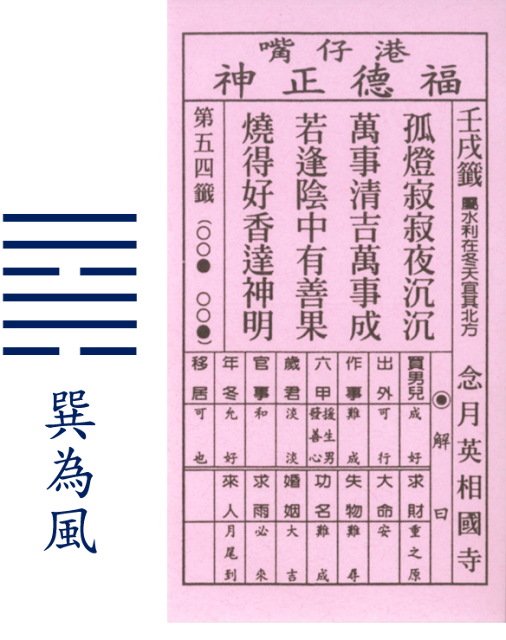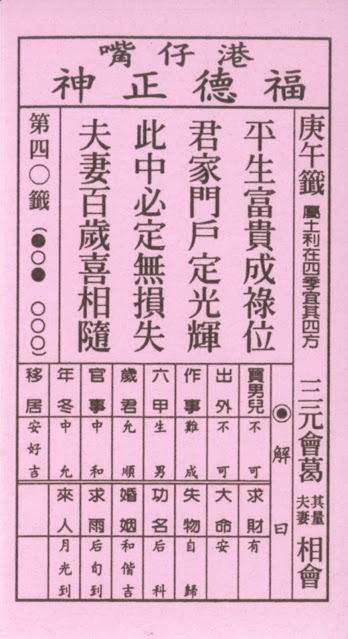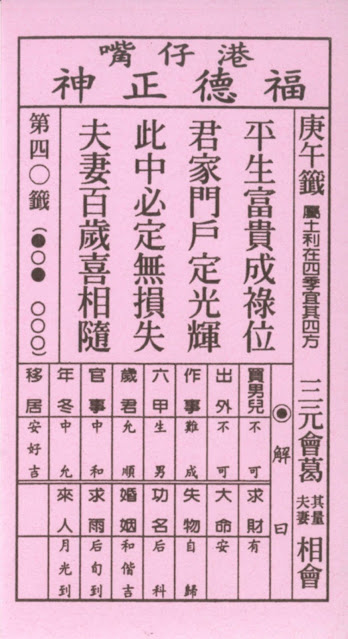第54籤 巽卦 54th DMP:Xun
第54籤 巽卦
54th Divine Metaphor Paper:Xun (The Gentle / The Penetrating / Wind)

---------------------------
初六:進退,利武人之貞。
最初的陰爻:取捨之間,有益於剛毅果決意志堅定之人。
Six at the beginning means: The choice is good for those who are determined.
---------------------------
九二:巽在床下,用史巫紛若,吉無咎。
位於第二層的陽爻:謙恭的立於坐榻下方,用各式各樣的大批人力兼顧現實面與精神面的工作任務,順利沒有罪責。
位於第五層的陽爻:堅守正道帶來順遂,追恨消失,沒有不好的。計劃開始時效果不明顯,結果卻是好的,施行前審慎準備,施行後仔細評估,一切順利。
Nine in the fifth place means: Staying true to the right way brings success, the hatred disappear, and there is nothing bad. At the beginning of the plan, the effect was not obvious, but the result was good. Carefully prepared before implementation and carefully evaluated after implementation, everything went well.
先庚三日,後庚三日:
古中國以十天干計日,十天干依序為甲、乙、丙、丁、戊、己、庚、辛、壬、癸。「先庚三日、後庚三日」就分別為丁日和癸日。
54th Divine Metaphor Paper:Xun (The Gentle / The Penetrating / Wind)

巽:小亨,利有攸往,利見大人。
初六:進退,利武人之貞。
九二:巽在床下,用史巫紛若,吉無咎。
九三:頻巽,吝。
六四:悔亡,田獲三品。
九五:貞吉,悔亡,無不利。無初有終,先庚三日,後庚三日,吉。
上九:巽在床下,喪其資斧,貞凶。
巽卦:小事逐漸順利通達,有助於向目標前行,有益於遇見貴人。
Xun: Small things gradually come to pass. It is helpful to move forward to the goal, and it is beneficial to meet the distinguished person.
巽:
讀作「訓」,字意隨詞性變化而有所不同。
九二:巽在床下,用史巫紛若,吉無咎。
九三:頻巽,吝。
六四:悔亡,田獲三品。
九五:貞吉,悔亡,無不利。無初有終,先庚三日,後庚三日,吉。
上九:巽在床下,喪其資斧,貞凶。
---------------------------
巽:小亨,利有攸往,利見大人。
註:大部份的易經書籍,爻詞斷點均以逗號標註。本宮以文法邏輯判斷略作調整。
---------------------------
巽:小亨,利有攸往,利見大人。
巽卦:小事逐漸順利通達,有助於向目標前行,有益於遇見貴人。
Xun: Small things gradually come to pass. It is helpful to move forward to the goal, and it is beneficial to meet the distinguished person.
巽:
讀作「訓」,字意隨詞性變化而有所不同。
名詞:卦名。
動詞:辭讓、謙遜。
形容詞:卑順、謙恭。
形容詞:卑順、謙恭。
It is pronounced "xun", and the meaning of the word varies with the part of speech.
Noun: Gua name.
Verbs: humble.
Adjectives: humble.
---------------------------
初六:進退,利武人之貞。
最初的陰爻:取捨之間,有益於剛毅果決意志堅定之人。
Six at the beginning means: The choice is good for those who are determined.
---------------------------
九二:巽在床下,用史巫紛若,吉無咎。
位於第二層的陽爻:謙恭的立於坐榻下方,用各式各樣的大批人力兼顧現實面與精神面的工作任務,順利沒有罪責。
Nine in the second place means: Humbly standing under the couch. The ceremony was held with various large numbers of people, and it went smoothly without guilt.
床:
史巫:
床:
這裡指的不是用來睡覺的床,而是指坐榻,在商周時代為貴族所享用。中國直到秦漢時期才開始有椅子的雛形出現。古代禮儀嚴格,坐於床上者地位較高,較卑位者則坐或立於床下。
This does not refer to a bed for sleeping, but to a couch. It was not until the Qin and Han Dynasties that the prototype of the chair appeared in China. In ancient times, the etiquette was strict. Those who sat on the bed had a higher status, and those with lower positions sat or stood under the bed.
史巫:
史官和女巫。
Historian and witch.
史官和女巫,分別做的是眼見為憑的事實記錄工作及一般人無法進行的神鬼溝通工作,代表的是現實面與精神面的工作任務均有人執行。
紛若:
豐盛繁雜的樣子。
Rich and complex look.
---------------------------
九三:頻巽,吝。
第位第三層的陽爻:皺著眉頭的表現謙遜,會帶來耻辱。
紛若:
豐盛繁雜的樣子。
Rich and complex look.
---------------------------
九三:頻巽,吝。
第位第三層的陽爻:皺著眉頭的表現謙遜,會帶來耻辱。
Nine in the third place means: A frowning expression of humility brings shame.
頻:
吝:
古同「顰」,皺眉的意思。
Frown.吝:
在此做「耻辱」解。
Shame.
皺著眉頭的表現謙遜即是心有不甘,不誠心誠意的結果,遲早會被視破而為自己帶來耻辱。
位於第四層的陰爻:心中陰霾盡去,收獲豐盛。
Six in the fourth place means: The haze in my heart is gone, and the harvest is rich.
田:
在古文中有二種意思,分別為「打獵」及「耕作」。
There are two meanings in ancient Chinese, namely "hunting" and "farming".
三品:
There are two meanings in ancient Chinese, namely "hunting" and "farming".
三品:
在此解為「三種用途」,分別為製作臘肉、宴請賓客,奉獻君上或敬鬼神。
This is interpreted as "three uses", which are making bacon, entertaining guests, offering a king or honoring ghosts and gods.
This is interpreted as "three uses", which are making bacon, entertaining guests, offering a king or honoring ghosts and gods.
---------------------------
位於第五層的陽爻:堅守正道帶來順遂,追恨消失,沒有不好的。計劃開始時效果不明顯,結果卻是好的,施行前審慎準備,施行後仔細評估,一切順利。
Nine in the fifth place means: Staying true to the right way brings success, the hatred disappear, and there is nothing bad. At the beginning of the plan, the effect was not obvious, but the result was good. Carefully prepared before implementation and carefully evaluated after implementation, everything went well.
先庚三日,後庚三日:
古中國以十天干計日,十天干依序為甲、乙、丙、丁、戊、己、庚、辛、壬、癸。「先庚三日、後庚三日」就分別為丁日和癸日。
In ancient China, people used the Heavenly Stems counts the day, and the Heavenly Stems are Jia(甲), Yi(乙), Bing(丙), Ding(丁), Wu(戊), Ji(己), Geng(庚), Xin(辛), Ren(壬), Gui(癸) in order.
The third one from Geng is Ding.
The third one after Geng is Gui.
The third one from Geng is Ding.
The third one after Geng is Gui.
庚:
有年歲更替的意思。
Has the meaning of age change.
丁:
在古文中,有時作「叮嚀」的意思。
In ancient Chinese, it sometimes means "reminder".
有年歲更替的意思。
Has the meaning of age change.
丁:
在古文中,有時作「叮嚀」的意思。
In ancient Chinese, it sometimes means "reminder".
癸:
在古文中,有時作「揆度」的意思,即現代白話文中的「評估」。
In ancient Chinese, it is sometimes used as the meaning of "evaluation".
在古文中,有時作「揆度」的意思,即現代白話文中的「評估」。
In ancient Chinese, it is sometimes used as the meaning of "evaluation".
Nine at the top means: A humble person is in a lower position, losing money and authority, and sticking to it will only have bad results.
資斧:
利斧,古時喻指錢財和權柄。
Sharp axe. In ancient times, it was a metaphor for money and power.
資斧:
利斧,古時喻指錢財和權柄。
Sharp axe. In ancient times, it was a metaphor for money and power.
---------------------------
-----------------------------------------------------
卦爻匯意:
巽,除了謙遜外,還有卑順之意;也就是說它是下屬對上司的謙恭。當做為下屬者,盡心盡力、守分的完成任務,自然得到青睞與讚賞而前途亨通。但當作為下屬的人,能力及各項條件都超越領導者時,就該當機立斷的離開,以免發生功高震主而招禍的遺憾。
籤頭故事解籤
The Stories and Their Metaphors on the Divine Metaphor Papers
第54籤 念月英相國寺
-----------------------------------------------------
-----------------------------------------------------











留言
張貼留言